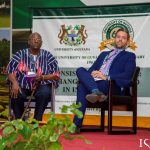Highlights of recent decisions taken by Fisheries Ministers of CARICOM

CARICOM Ministers responsible for fisheries have adopted the Protocol to the Caribbean Community Common Fisheries Policy on Aquatic Foods as a Strategic Resource for Food and Nutrition Security. This marks the third protocol adopted under the regional fisheries policy.
The Ministers met late on 27 April for the 17th Ministerial Council of the Caribbean Regional Fisheries Mechanism (CRFM).
Some key areas discussed were:
- fisheries management;
- illegal, unreported and unregulated fishing and fisheries crime;
- climate change and ocean acidification;
- imbalances in international trade;
- Sargassum influxes; and
- the emerging Blue Economy
Other key actions taken at the meeting were:
- The Fisheries Ministers welcomed the final approval of the Project Document by the Global Environment Fund (GEF) for the US$48 million project—the CAF/FAO/CRFM/GEF/Caribbean Blue Economy Project entitled, Promoting National Blue Economy Priorities Through Marine Spatial Planning in the Caribbean Large Marine Ecosystem Plus or the BE-CLME+ Project, which should commence this July.
- The Ministers provided guidance on the project entitled, Sargassum Products for Climate Resilience in the Caribbean, being jointly implemented by the CRFM and the New Zealand Plant and Food Research (PFR). The parties are exploring the opportunities for safely producing liquid fertilizers, compost, and other potential products from Sargassum.
- The Ministers issued a strong resolution establishing a roadmap to strengthen measures to prevent “ghost fishing” or abandoned, lost and otherwise discarded fishing gear (ALDFG), which is one of the most harmful forms of marine debris.
- The Ministers are asking the CRFM Secretariat to work with the International Atomic Energy Agency (IAEA) under the Regional Strategic Framework for Cooperation between the IAEA and CARICOM Member States (2020-2026).
- The policymakers also endorsed the Convention on Biological Diversity Global Biodiversity Framework, which was adopted by the 15th Conference of Parties to the Convention in December 2022.
- They also reviewed the status of a request made to FAO and reaffirmed the priority accorded to that request, for securing the services of the modern Norwegian marine survey vessel, the Dr. Fridtjof Nansen, to conduct a comprehensive survey of the marine resources in the offshore waters of CARICOM States, to support blue economic development and sustainable use of the living marine resources.
Fisheries ministers of CRFM /CARICOM Member States meet at least twice yearly, in regular and special sessions. They are due to meet again in October 2023, during the Caribbean Week of Agriculture.
Source: CARICOM TODAY

 Previous Post
Previous Post Next Post
Next Post